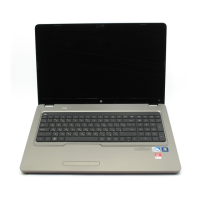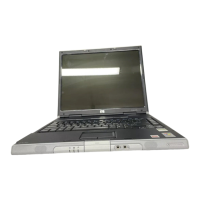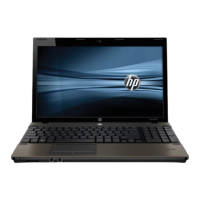Do you have a question about the HP Notebook 14 and is the answer not in the manual?
Identifies external components on the right side of the computer, specific to certain models.
Details external components on the left side, including ports and slots.
Describes components of the computer's display, including webcam and antennas.
Identifies external components on the front, such as speakers and memory card reader.
Details components on the top surface, specifically the TouchPad.
Explains indicator lights like power light and microphone status.
Describes the function and operation of the computer's power button.
Identifies special keys (ESC, Fn, Windows) and action key functionality.
Guides on finding essential system information like serial and product numbers.
Lists and illustrates main internal components for identification and replacement.
Details individual parts of the display assembly, including bezels and panels.
Lists smaller or accessory components like AC adapter and screws.
Lists the specific tools needed for hardware removal and replacement procedures.
Provides general advice and precautions before starting disassembly and assembly.
Guidelines for handling and routing cables to prevent damage during service.
Precautions for safely handling storage drives during service.
Explains ESD risks and essential grounding procedures to protect components.
Details proper methods for packaging components to prevent ESD damage.
Outlines requirements for setting up a safe, static-free workstation.
Lists recommended grounding equipment for ESD protection.
General instructions and notes applicable to all component removal and replacement tasks.
Step-by-step guide for removing and replacing the computer's base enclosure.
Procedure for safely removing and replacing the laptop battery.
Instructions for removing and replacing the optical drive dummy component.
Detailed steps for removing and replacing the computer's hard drive.
Procedure for removing and installing memory modules (RAM).
Steps for removing and replacing the Wireless LAN module.
Instructions for removing and replacing the heat sink and fan assembly.
Procedure for removing and replacing the internal speakers.
Steps for removing and replacing the internal microphone.
Detailed procedure for removing and replacing the main system board.
Instructions for removing and replacing the WLAN cable.
Procedure for removing and replacing the entire display assembly.
Steps for removing and replacing the integrated webcam module.
Guides on how to access and start the BIOS Setup Utility for system configuration.
Information on how to obtain and install updated versions of the BIOS.
Methods to check the current BIOS version installed on the computer.
Instructions for creating system recovery media and personal data backups.
Explains how to use built-in Windows tools for creating backups and restore points.
Overview of system recovery options, including factory reset and using recovery media.
Steps to initiate HP PC Hardware Diagnostics (UEFI) to test system hardware functionality.
Guide on downloading the diagnostic tool to a USB drive for external testing.
Provides detailed technical specifications for the computer's dimensions, power, and environment.
Specific technical details about the computer's 14-inch display panel.
Technical details regarding the computer's hard drive, including dimensions and transfer rates.
General requirements applicable to power cord sets used in any country or region.
Details specific power cord requirements based on country or region accreditation.
| Display Size | 14 inch |
|---|---|
| Operating System | Windows 10 or Windows 11 |
| Graphics | AMD Radeon Graphics |
| Display | HD (1366x768) or Full HD (1920x1080) |
| Wireless | Wi-Fi 802.11ac, Bluetooth 4.2 |
| Ports | HDMI, Headphone/Microphone combo jack |
| Webcam | HD Webcam |
| Battery | 3-cell or 4-cell Li-ion |
| Processor | Intel or AMD (various models) |
| RAM | 4GB/8GB/16GB DDR3/DDR4 |
| Storage | 500GB/1TB HDD or 128GB/256GB SSD |











